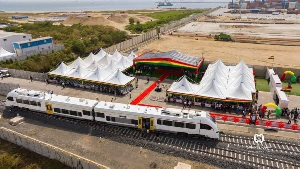Please see attached
WE CAN DO BETTER ON SELF-RELIANCE: CPP'S REPSONSE TO 2012 BUDGET
Our response to the 2012 budget is informed by our vision for Ghana and its people, and how the economy can function to deliver prosperity for all. This requires strategic long-term development planning, the building of human capacity, developing our ability to offer fair distribution of opportunities, the lessening of our dependence on external sources and a commitment to self-reliance. Ghana's wealth, the CPP believes, must benefit all Ghanaians.
The CPP's priorities remain health, education, agriculture, industrialisation, Infrastructure development and job creation. These are the areas we will prioritize when returned to government. This budget, from a government that has been in office for 3 years, in our view falls short of such important nation building considerations. Ghanaians will be right in expecting more. It is reasonable to ask for more strategic focus from a government that is responding to the challenges of the twenty first century.
First and foremost the budget lacks any signal or policy initiative or measures to re-orient our economy from one of dependency to genuine self-reliance. The proposal to convene a donor conference on the Savannah Accelerated Development Authority (SADA) is a clear example of premising local development on external sources of finance and direction. How does the NDC government, which promised to give $200m to the Savannah Accelerated Development Authority end-up drip-feeding with first GhC25m and now a pledge of GhC30m as their final contribution. Is this not subjecting the whole future of SADA to the benevolence of the donor communities and the attendant conditionalities that normally come with this?
Importantly, there appears to be no policy initiatives to address job creation and the expansion of our manufacturing sector. This sector should be more robust if the government’s claims of Ghana being a middle-income economy are to be believed. In the 2011 budget, the target growth for the manufacturing sector, a main vehicle for job creation, was 7.0% and the provisional outturn was 1.7%. Over the last 10 years our manufacturing capacity has declined and its contribution to GDP fell from about 9% in 2000 to 6.8% in 2010 and Ghana imports virtually everything. Redressing this requires that we should have in place a long-term strategy for improving our performance in this sector. The CPP would have laid the basis for transforming this sector through its budget provisions and allocation of resources.
While we welcome the increase in corporation tax for the extractive industries from 25 to 35 percent we believe this should be complemented by an industrial policy that seeks to add value to our primary products. We need a situation in Ghana where we can add value to our resources, leading to growth in our manufacturing sector and creating more employment opportunities. What is government's plan to reap the full benefits of this and the proposed 10% windfall tax? It must be clear that falls in inflation rates and interest rates do not by themselves equate to development. Ghana is a developing country and focusing on fighting inflation rather than job creation initiatives is an example of a missed opportunity.
As a party the CPP has always believed in self-reliance and the extent to which we create an enabling environment for Ghanaians and businesses is important. Our economy is too reliant on external sources of funding and we need to redress this. Rather than use excise duty exemptions, we need to focus on how to create a more enabling environment for Ghanaians to engage in small-scale enterprises and make provision for protecting the restricted areas in the economy reserved for Ghanaians. We must ensure that there are incentives including start up grants and credit facilities to make our entrepreneurs viable. Similarly we are concerned about the sustainability of increased domestic and international debt particularly as we do not see a clear process of investing these funds in important areas of the economy.
Whilst welcoming social interventions on school uniforms, text books and enhancing the school feeding programmes we need to be mindful of tackling the skills gap in the country which is evident in the fact that 50 per cent of our BECE candidates are failing their exams. This failure rate is a reflection of both inadequate educational facilities and the shortage of the skills required to improve the education of our children. So uniforms and text-books aside, we should invest more strategically in education.
In terms of agriculture, which is the mainstay of the economy, we are pleased to note the expansion in cocoa production to 1 million tonnes. One question that we need to clarify is when will this be linked to a programme for enhanced local value addition? We see particular weakness in the budget of a failure to provide important information on the monitoring and evaluation of government activities. For example why is there no information on the implementation of previous programmes on hectares of land actually irrigated? Similarly, it would have been useful to know how many tonnes of subsidised fertilizer were provided and what the total crop yield was.
Our concerns with this budget from an integrated development planning perspective are many and although we have commended government where necessary it is our view that several opportunities have been missed to enhance Ghana's prospects for development anchored on greater self-reliance. This in our view is how we make development meaningful to the average Ghanaian man and woman and children who our future depends on.
SIGNED : IVOR KOBINA GREENSTREET – GENERAL SECRETARY
General News of Thursday, 17 November 2011
Source: --
















